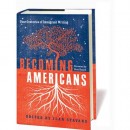 Ilan Stavans, editor of Becoming Americans: Four Centuries of Immigrant Writing
Ilan Stavans, editor of Becoming Americans: Four Centuries of Immigrant Writing — which includes 85 writers from 45 countries and spans from 1623 to 2003 — is interviewed about the project:
Q: Almost every selection grapples with what you call the “verbal dilemma,” the immigrant’s struggle with learning a new language and preserving or losing her native tongue. . . . Do you think that the complex feelings involved in dealing with this language crisis was what drove so many of the volume’s contributors to become writers?
A: My own experience is perhaps emblematic. As I wrote in my memoir On Borrowed Words, I arrived in New York City in 1985 with a lexicon of approximately a hundred words. My acquisition of English ran parallel to my Americanization: the more I understood, the less awkward I felt in this land. Yet the English I encountered wasn’t uncontaminated. What I heard most often was Spanglish, a mix of English and Spanish. And while I was able to distinguish between high-brow and popular parlance, these two spheres made me understand that the real immigrant experience isn’t told in a pure, unadulterated style. The immigrants’ voices, their goals, and their achievements vary considerably. Nabokov, for instance, is a stylistic craftsman, so is [Felipe] Alfau. They hope to write as if they are native English writers, although their degree of foreignness obviously betrays their origins; in other words, they write as if in translation. In contrast, Jamaica Kincaid is perfectly natural in her English as is Edwidge Danticat, perhaps because the two arrived in the U.S. as children. Every immigrant reinvents the language anew. In fact, I’m convinced that it is thanks to immigrants that English remains vital.

